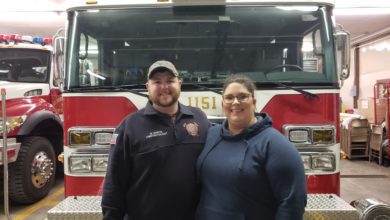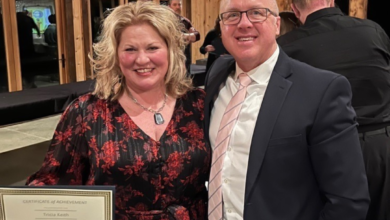Clingan’s volunteer work with the Education Justice Project impacts lives of underserved

The right to learn: it may seem like a simple right granted to all.
But for those in the United States prison system, the right to educate oneself or the right to an education is not something that is always readily available.
Ten years ago, the University of Illinois Urbana-Champaign partnered with the Danville Correctional Center to bring quality post-secondary education to incarcerated individuals.
Today, through the Education Justice Project, those within the prison system are students who eventually become alumni.
St. Joseph resident Holly Clingan became involved with the Education Justice Project five years ago, while she was working on a master’s degree in library sciences at the University of Illinois.
A native of Vermilion County, Clingan re-entered the workforce at the University when her youngest son, now 15-years old, started kindergarten. She worked at the University while completing her master’s program and continues to work there today as the Associate Director of Principal Gifts.
Part of the library science program, Clingan became aware of the Education Justice Project through an information table. When she learned that the program had a mindfulness class, an ESL class and a library, she knew that her degree could make her an asset to the program.
Around the same time, Clingan read “The New Jim Crow: Mass Incarceration in the Age of Colorblindness” by Michelle Alexander.
Challenged by statistics that show the rise of prison populations in America and that 60 percent of those incarcerated are people of color, Clingan felt like her education had led her to a place where she could positively impact lives.
“It was a big eye-opener for me in all that,” she said.
“After I read that book, I felt so overwhelmed. There’s this guilt of privilege that I have. How can I help with such a big problem like that? How can I be a part of turning around that injustice? This is something that I felt like I could use my skills to volunteer that skill set.”
As the Community Librarian at EJP, Clingan works to create spaces and programs that give students leadership and study skills, that provide safe spaces for conversation and that even give them a respite from their everyday life in the Danville Correctional Center.
Acquiring materials for the library collection is oftentimes a lengthy process because books are required to go through inspection, but the EJP library has a fiction and academic section that are maintained by Clingan’s student workers, which include 15 inmates.
With a collection of only printed materials, the student workers have learned to use the Dewey Decimal System to classify their collection, making it easy for students to have access to the materials they need for their studies.
Students are required to apply for the post-secondary program at EJP, which include 300 and 400-level courses of subjects like anthropology, engineering, art history, communication, education policy, biology and life sciences, among others. Passing students receive University of Illinois credit, which can be used toward a degree program once released.
“We have students who are pursuing their degrees on the outside now. Once they are released, we call them ‘alumni’ of our program.”
Careful about the language that is used, EJP draws dignity to everyone in the program by referring to the men in the program as students and alumni, and volunteers in the program as members.
“There’s an equality across what we do with our members and students,” Clingan said.
But not everything in EJP is serious.
Clingan realized that she needed to help her staff gain leadership and team building skills. She used some of the same programs the University of Illinois uses when they bring their employees closer together.
“We played two truths and a lie,” Clingan said.
She then had her staff write down one song they’d sing in karaoke if they had to at that moment. The staff went around the room and guessed who said what song.
“It was so much fun,” she said. “It was a crack-up. They got to know each other a little better in a goofy way.”
Her staff has also enjoyed SWOT (strengths, weaknesses, opportunities and threat) training.
“No one is teaching them those skills in a college classroom setting,” she said. “They are hungry for those things, too.
“They want to learn about how to be better leaders in their communities, about how to be community organizers.
“A lot of guys want to go back to their communities and be motivational speakers and give back to the people they grew up with in their communities.”
After five years as the EJP librarian, Clingan doesn’t have to go to the facility as often as she used to because her staff takes care of the space.
But her staff, alongside other students, knows that the library is a safe space for them to either get away from the noisy cell space or to discuss topics among friends.
“I guess what I hope to create in our spaces is an oasis of community and mutual respect among fellow students,” Clingan said.
“A place where guys can debate topics and learn from each other.
“Everything is so hyper masculine on the outside, they can kind of shed that a little bit when they are in the EJP spaces.
“Our program treats people with dignity and respect, it treats them as human beings. We create an environment that values people’s interests from an academic interest and personal reading interest.”
With academic courses under their belt and confidence that comes with being respected, the EJP program also prepares students to maneuver through life on the outside with a comprehensive reentry guide that is available to students before and after release.
The guide is also requested by other inmates through the Illinois prison system.
Clingan said that EJP is always looking for volunteers who can work with students during the evening hours as they navigate their studies.
EJP is also in need of volunteers who can teach a subject, host a book club, give a book talk, teach a songwriting class or talk about entrepreneurship or how to start a small business.
St. Joseph resident and poet Jim O’Brien runs a poetry reading in December.
“For me it hasn’t been just about reducing recidivism,” Clingan said.
“A lot of people that think of course we want to educate prisoners because it helps them rehabilitate, but that’s not always the right approach, I think. Because it’s about giving them safe spaces to have conversations, it’s about just bettering humanity.”





